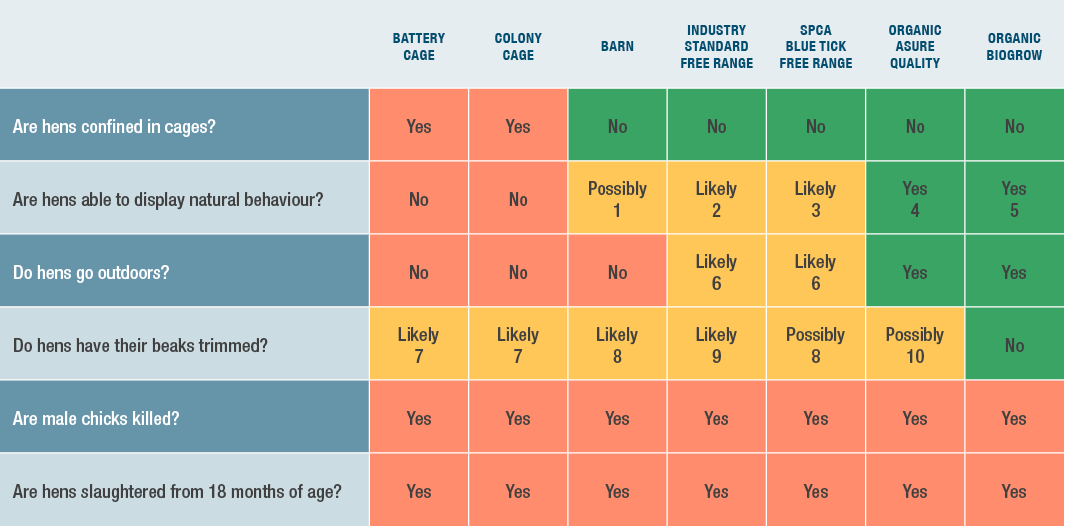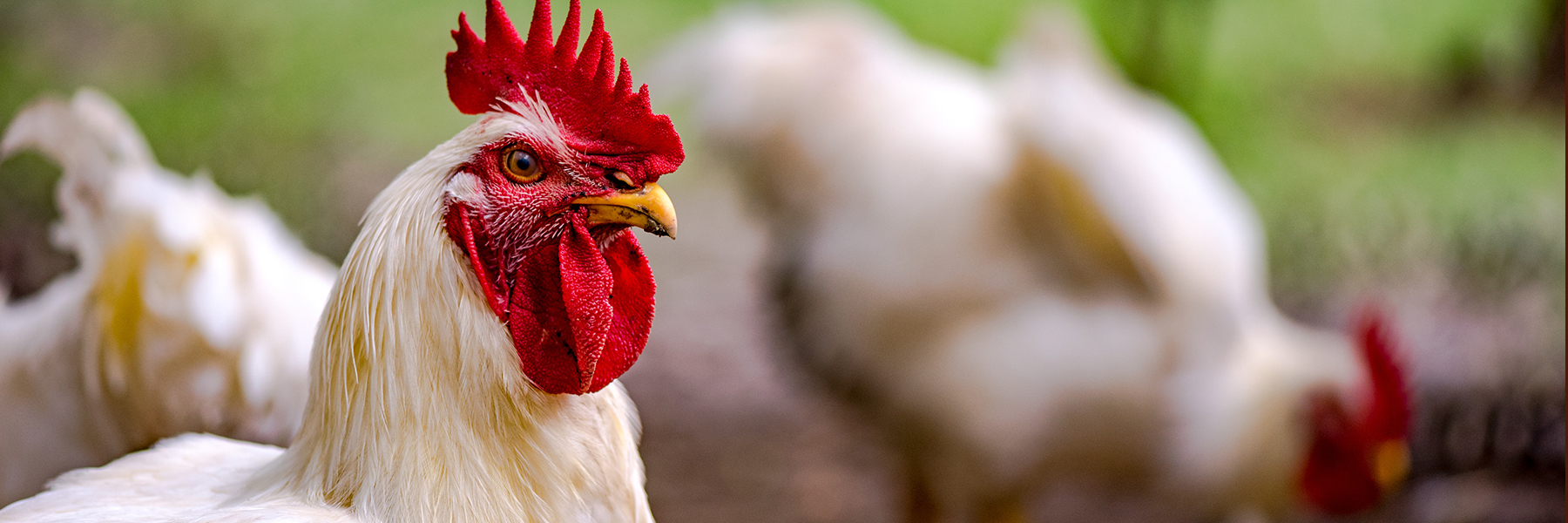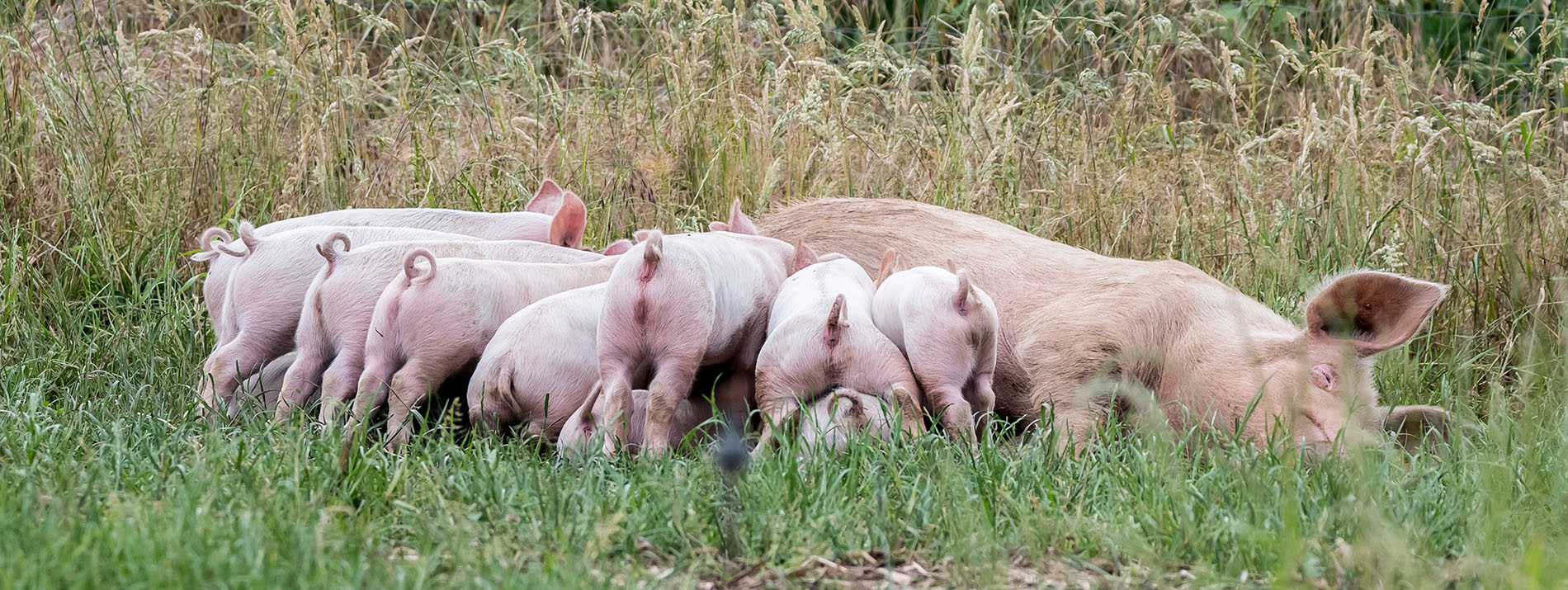Many people are choosing free-range eggs and meat because they hope free-range animals have a better life than those kept in intensive factory farms. However there are welfare concerns with all forms of animal farming and the animals are killed far short of their natural lifespan.
Hens are intelligent, curious and socially complex animals, so it’s important that they be allowed to perform their natural behaviour in an appropriate environment.
Unlike hens confined to battery and colony cages, free-range hens are given access to the outdoors. While the life of a free-range hen is generally better than that of a caged hen, free-range farming systems still present many welfare concerns.
Because the code of welfare for “layer” hens doesn’t specify basic standards for free-range egg farms, there is no minimum requirement for the size of outdoor areas or the suitability of these outdoor areas for the hens. There is also no specification of the maximum number of hens allowed per flock. Therefore, the quality of life a free-range hen on one farm can be vastly different to that of a hen on another free-range farm.
Free-range hens can, in theory, forage, dust bathe and roam within a restricted outdoor area. However, studies show that many hens in these systems are unable to even gain access to the outdoors due to the high number of birds in the shed and the limited number of “pop” holes the hens can use to access the outdoors.
There may be up to 10,000 hens in a free-range flock. Hens can recognise up to 100 other hens and naturally maintain a pecking order within a flock, however hens kept in huge flocks in commercial systems cannot establish a stable social structure. This causes stress and frustration, which can lead to aggressive behaviour such as feather pecking and cannibalism. To reduce damage to other birds, hens usually have the sensitive tip of their beaks cut off.
Another welfare concern is that all male chicks are killed at one day old, as they are unable to lay eggs.
Most free-range hens will be killed at the same age as caged hens (between 12 and 18 months). The natural lifespan of a hen is around 10 years.
Find out more about different types of egg production with our Guide to Egg Labelling.
Incorporate hen-friendly egg alternatives into your diet. Check out our list of egg substitutes.
Over three million hens live short and cruel lives crammed into wire cages. Eighty-two per cent of the one billion eggs consumed in New Zealand are produced by hens that spend their entire lives on an individual floor space barely larger than an A4 sheet of paper.

Chickens are curious, social birds who enjoy exploring, basking in warm sunshine and keeping their feathers and skin healthy by giving themselves a dust bath. Current intensive farming systems deny these birds activities such as these, activities that make their lives worth living.
The vast majority of chicken meat available in supermarkets, cafés, restaurants and fast food outlets is produced in intensive factory farms where birds are crammed together in windowless sheds, with no access to the outdoors.
Approximately 2% of birds are raised as “free-range.” Free-range chickens bred for meat are given access to an outdoor area for the last two to three weeks of their lives, before they are killed at around six weeks of age.
Despite having access to an outdoor area, many free-range chickens bred for meat never go outside because they have to get past thousands of other birds to reach the limited number of pop holes. The huge proportion of birds that are lame or struggle to move more than a few steps due to metabolic disease are also unlikely to go outside.
The birds used in free-range farms are the same “fast-grow” breeds used on conventional chicken meat farms, so they suffer similar explosive growth. This leads to a high prevalence of painful lameness, joint collapse, and respiratory and heart problems.
As with intensive chicken production, the parent birds used to produce free-range birds are constantly hungry, as they are kept on a restricted diet in order to prevent them from growing too fast. If the growth of these parent birds was not controlled, they would not survive to keep producing fertilised eggs.
Pigs are highly social animals who naturally live together in small maternal groups with their piglets. They are highly intelligent (more so than dogs), they have long memories, and love to play. Sows are generally caring mothers who communicate with their babies using sounds that may be unique to each individual.
In any kind of pig farming system, the average age of a piglet when they are sent to slaughter is only 16 weeks. If allowed to live out their natural lifespan, pigs can live for 15 years or more.
Husbandry practices on free-range farms can be stressful and painful. Many free-range pigs have rings inserted through their noses to prevent them rooting in the soil, thereby denying them an important natural behaviour.
Pigs raised for meat are often described as “free farmed,” not free-range farmed. Free farmed means that the animals are housed in “eco” barns with litter material on the floor to root in. They cannot roam outdoors.
Be kind to pigs by choosing plant-based meat alternatives.
Animal industries in New Zealand do not have their own free-range certifications because this would highlight the different standards of welfare in the various production systems.
Industry bodies such as the Egg Producers Federation of New Zealand, the Poultry Industry Association of New Zealand and New Zealand Pork represent all producers, from intensive cage and crate farmers to free-range producers. These bodies are not interested in introducing clear labelling systems identifying the different production methods used, as they know that Kiwis are against animal cruelty and clear labelling would disadvantage the intensive producers they represent.
SAFE does not endorse any animal production method. Most animal husbandry practices can cause at least some stress or pain and, of course, no farmed animal can fully express its natural behaviour nor live out its natural lifespan.
Moving away from dairy is a choice that benefits animals, our planet and our health. There’s never been a better time to go dairy-free. Whether you’re looking for tips on the best plant-based cheese or ice cream or on the lookout for new dairy-free recipe ideas, we’ve got you covered!
As a charity, SAFE is reliant on the support of caring people like you to carry out our valuable work. Every gift goes towards providing education, undertaking research and campaigning for the benefit of all animals. SAFE is a registered charity in New Zealand (CC 40428). Contributions of $5 or more are tax-deductible.

